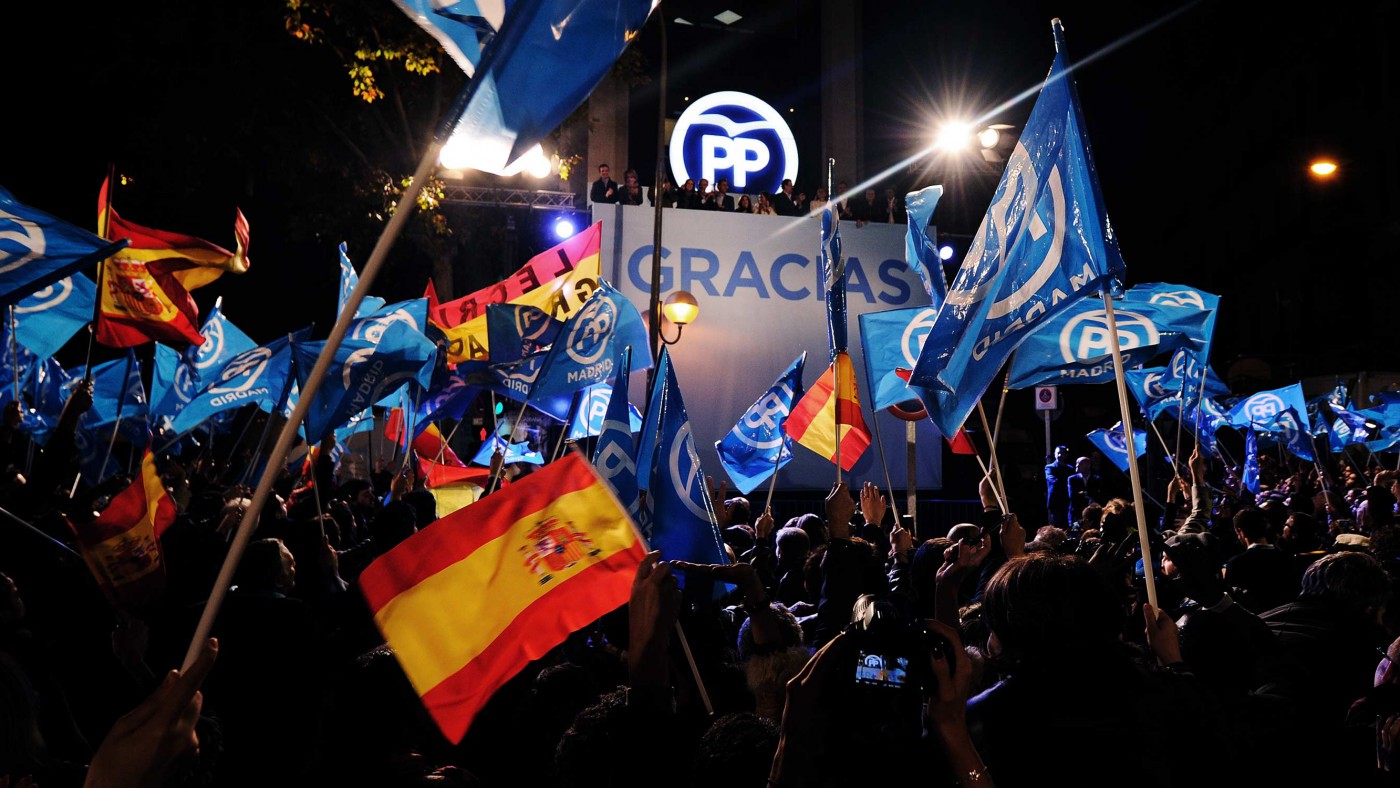A mixed bag for the Popular Party
The votes have been counted, and Spain’s ruling right-wing Popular Party has achieved success, of sorts. With 28.72% of the votes, equating to 123 seats, it is the largest party by far. The PP even managed to top last week’s poll, which put it at 25.3%. But this will be of little consolation. The PP went into this election with a majority, having overseen Spain’s economic recovery and with unemployment down to 21%. That should have been enough to guarantee electoral victory. Instead, it has lost 63 seats, and is 53 short of a majority. Without a clear win, the PP is now looking for form a coalition or failing that, a minority government.
Rajoy is still in trouble
With nearly 29% of the votes, Prime Minister Mariano Rajoy has insisted he will try to form a government, saying “This party is still the number one force in Spain”. But despite his apparent confidence, his options are limited. He is hated by all three of the other party leaders, all of whom have ruled out backing him in a coalition. To say that is unpopular is an understatement. A poll from April reveals that Rajoy is more hated than Franco by Spanish millennials, and just two days before the election, the Prime Minister was punched in the face by a teenager at a rally in Galicia. With his regime marred by accusations of corruption, Rajoy enters into coalition negotiations with limited prospects.
A victory for anti-austerity?
On the other side of the aisle, the Socialist Party has 22%, while the anti-austerity upstart Podemos defied expectations by winning 20.66%. Together, these two left-wing parties are just 17 seats short of a majority, putting them in a strong position going into coalition talks. Socialist leader Pedro Sánchez has declared that “Spain wants a move to the left”, while Podemos leader Pablo Iglesias has heralded the results as the birth of a new Spain, saying “Spain is not going to be the same anymore and we are very happy”. Meanwhile Syriza, Podemos’ Greek sister-party, has been watching closely. Greek Prime Minister Alexis Tsipras tweeted:
Austerity has now been politically defeated in #Spain, as well. Parties seeking to serve society made a strong showing #20D
— Alexis Tsipras (@tsipras_eu) December 21, 2015
Claiming that austerity has been defeated when the right-wing PP won the most votes may seem contradictory, but the results are so mixed that anti-austerity campaigners are free to interpret the election as a win.
Ciudadanos under-performed but is still crucial
Despite a phenomenal rise, the centrist Ciudadanos has come fourth, with 40 seats. This will be disappointing, especially to those who hoped for a new era of common sense policies which defied the left-right divide. However, Ciudadanos leader Albert Rivera now finds himself in a unique position. As the PP’s only plausible coalition partner, he has the power to make or break the next Spanish government. While he has stated he will not enter into a coalition led by Rajoy, he could still prop up a minority PP government by abstaining in a vote of confidence. If the PP wants a more stable agreement with Ciudadanos, the anti-corruption centrists could demand Rajoy step down and be replaced by his deputy, Soraya Sáenz de Santamaría, and would be in a position to bargain for electoral reform. Alternatively, Ciudadanos could lend its 40 seats to a three-way coalition with the Socialists and Podemos. While unlikely (there is little common ground between Ciudadanos and Podemos), it was this kind of arrangement that brought down the minority centre-right government in Portugal last month.
Spain enters a new period of uncertainty
The key takeaway from this election is that there are no obvious answers. Spain is well and truly split, not just between left and right, but between old and new. Taking a step back from the mechanics of how to form a government from the fractured results, we should keep in mind that 35% of Spaniards voted for parties that did not exist in the last national elections. For a country that has maintained a two-party system since the end of the Franco regime, this is truly revolutionary. And while the parties scrabble over negotiations, coalitions and crucial alliances, one thing is clear: Spain’s new fragmented electoral landscape is here to stay.


